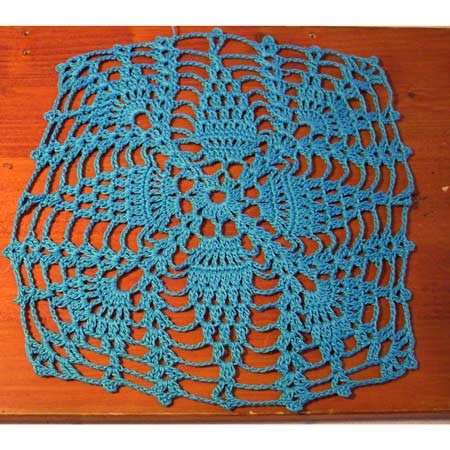Crochet Vindemiatrix Doily

The Crochet Vindemiatrix Doily is a charming and intricate piece that adds a touch of elegance to any room. With its delicate design and fine details, this doily is perfect for showcasing on tables or furniture surfaces. The Vindemiatrix pattern creates a beautiful combination of loops and stitches, resulting in a lovely finished product that will surely impress your guests.
Whether you're a seasoned crocheter or just starting out, this doily is a fun and rewarding project to work on. So grab your crochet hook and some yarn, and let's create a stunning Crochet Vindemiatrix Doily together!The Crochet Vindemiatrix Doily is a charming and intricate piece that adds a touch of elegance to any room. With its delicate design and fine details, this doily is perfect for showcasing on tables or furniture surfaces. The Vindemiatrix pattern creates a beautiful combination of loops and stitches, resulting in a lovely finished product that will surely impress your guests. Whether you're a seasoned crocheter or just starting out, this doily is a fun and rewarding project to work on. So grab your crochet hook and some yarn, and let's create a stunning Crochet Vindemiatrix Doily together!Size : 24x24 cm (10x10 inches)
Material: Pearl cotton # 5, hook 1.7 mm (US steel #); you can substitute with Cebelia #10 or equivalent ecosse or cordonnet thread (but the gauge can slightly vary)
Stitches (for reference, look at basic stitches page): ch, sc, dc, tr
dc cluster = dcl = (dc not closed on first st, dc not closed on second st, close dc together)
Puff dc = puff = (2 cd not closed in same st / sp, close dc together)
Shell = (2 tr, 2 ch, 2tr) in same sp/st.
Picot = (3 ch, sc in first ch)
Picoted shell = pshell = (2 tr, picot, 2tr ) in same sp/st.
Difficulty: medium.
Directions
Start with 10 ch, join with sl st
1, (3 dc in lp, 2 ch) 8 times, join with sl st to first st.
2. [shell in next lp, 4 ch, sc in next lp, 4 ch]*. Repeat * to * 4 times, join with sl st to first st.
3. [shell in next shell, 3 ch, (4 dc in next sp) twice, 3 ch]*. Repeat * to * 4 times, join with sl st to first st.
4. [Shell in next shell, 5 ch, (tr in next dc, 1 ch) 7 times, tr in next dc, 5 ch]*. Repeat * to * 4 times, join with sl st to first st.
5. [(2 tr, 2 ch, 2 tr, 2 ch, 2 tr) in next shell, 5 ch, (sc in next tr, sc in next sp) 7 times, sc in next tr, 5 ch]*. Repeat * to * 4 times, join with sl st to first st.
6. [(shell in next sp, 5 ch) twice, sk a sc, (dcl on next 2 sc, 2 ch) 5 times, dcl on next 2 sc, sk sc, 5 ch]*. Repeat * to * 4 times, join with sl st to first st.
7. [shell in next shell, 8 tr in next sp, shell in next shell, 5 ch, (puff in next sp, 2 ch) 4 times, puff in next sp, 5 ch]*. Repeat * to * 4 times, join with sl st to first st.
8. [Shell in next shell, (tr in next tr, 1 ch) 7 times, tr in next tr, shell in next shell, 5 ch, (puff in next sp, 2 ch) 3 times, puff in next sp, 5 ch]*. Repeat * to * 4 times, join with sl st to first st.
9. [shell in next shell, 2 ch, (puff in next sp) 4 times, 2 ch, (puff in next sp) 4 times, 2 ch, shell in next shell, 5 ch, (puff in next sp, 2 ch) 2 times, puff in next sp, 5 ch]*. Repeat * to * 4 times, join with sl st to first st.
10. [shell in next shell, 3 ch, (puff between next 2 puffs) twice, 3 ch, shell in next 2-ch sp, 3 ch, skip 2 puff, (puff between next two puffs) twice, 2 ch, shell in next shell, 5 ch, puff in next sp, 2 ch, puff in next sp, 5 ch]*. Repeat * to * 4 times, join with sl st to first st.
11. [shell in next shell, 5 ch, puff between next 2 puffs, 4 ch, (2 tr, 5 ch, 2 tr) in next shell, 4 ch,(puff between next two puffs, 5 ch, shell in next shell, 5 ch, puff in next sp, 5 ch]*. Repeat * to * 4 times, join with sl st to first st.
12. [pshell in next shell, 5 ch, (dc, picot, dc) on next puff, 5 ch, (2 dc, ch, tr, picot, tr, ch, 2 dc)in next 5-ch sp, 5 ch, (dc, picot, dc) in next puff, 5 ch, pshell in next shell, 4 ch, (dtr, picot, dtr) in next puff, 4 ch]*. Repeat * to * 4 times, join with sl st to first st. Cut thread.
N.B.
- Always substitute (also if not explicitly said) first st in a row as follows:
- first sc with 1 ch, sc;
- first hdc with 2 ch;
- first dc with 3 ch;
- first tr with 4 ch ... and so on
- When you read "sl st to <location>", where the location is not immediately contiguous to last st, this means of course "an appropriate number of sl sts for reaching <location>".
- Also if I do not specify it, if you lasted prev row on a st (say st1), while you must start next row in another st (say st2), make an appropriate number of sl sts to reach st2.
